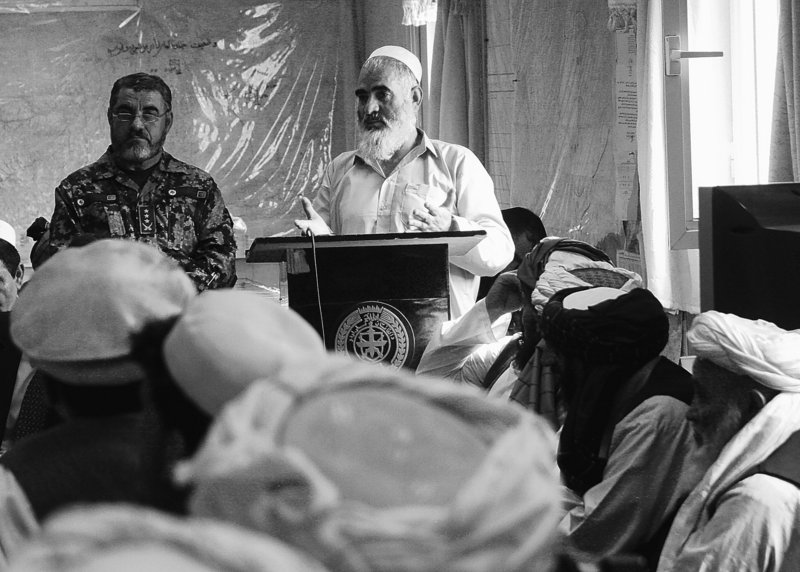KABUL, Afghanistan – After three years in Afghanistan’s controversial Bagram military detention center, Haji Gulam Farouq finally got a chance Saturday to speak his mind to one of America’s top generals.
Standing before a group of U.S. military officials, Afghan lawmakers and tribal elders taking part in a special prisoner release ceremony, Farouq said he was afraid that he was forever tarnished as a suspect who could be scooped up again at any time.
“I’m not happy to go home,” Farouq told U.S. Marine Lt. Gen. John R. Allen, the No. 2 at U.S. Central Command in Florida.
“I was a mujahedeen commander,” said Farouq, who was accused of working with Taliban insurgents. “It didn’t make sense for me to be against this government.”
With Allen as a special guest, Farouq and 10 other Afghans were freed Saturday afternoon as part of a program designed to combat persistent perceptions that the U.S. military unfairly holds hundreds of innocent men swept up by overzealous soldiers hunting insurgents.
So far this year, U.S. officials have freed nearly 200 men as part of the program that enlists tribal elders, lawmakers and local leaders called upon to make sure the detainees don’t use their freedom to fight U.S.-led forces in Afghanistan.
After Farouq spoke, Allen delivered a contrite speech as Afghan leaders and former prisoners munched on fresh fruit and chocolate cake.
“If we detained you unfairly, I am sorry,” Allen told the men. “I hope this is a great day for you to return to your families.”
Saturday’s ceremony at a military base was designed to help defuse one of the more volatile issues in Afghanistan: Prisoner abuse.
For many Afghans, Bagram is synonymous with Abu Ghraib in Iraq and Guantanamo Bay, Cuba.
Prisoner rights activists long called for the closure of Bagram amid persistent reports that prisoners were abused at the detention center on a U.S. airfield 40 miles north of Kabul. In one of the highest-profile cases, a U.S. Army investigation called for the prosecution of 27 people for involvement in the deaths of two Afghan detainees fatally beaten in 2002.
Late last year, the Obama administration closed Bagram and opened a modern new facility nearby designed to hold about 1,000 people.
Inmates at the new facility have praised it as a significant step up from Bagram. But the Obama administration has been accused of running a second detention center that Afghans call the “black prison.”
On Saturday, as he sat awkwardly in a wooden chair waiting to be officially freed, Azzimuddin, a father of four, said he spent more than two weeks in the “black prison” where he was held in a small, isolated cell.
Azzimuddin, 38, said he was eventually sent to the main facility where he was interrogated every day for nearly three months about accusations that he’d helped arm the Taliban.
“Why was I detained?” he asked. “At the end of the day, they said: ‘You are innocent.’ “
Capt. Jack Hanzlik, director of public affairs at U.S. Central Command, said that the Afghan government and International Committee of the Red Cross were both aware of all detention centers in the country.
“We don’t operate any secret detention centers,” said Hanzlik.
Several detainees in the group freed Saturday said that they had faced intense interrogations, but had not been abused.
During the ceremony, Dawood Zazai, an outspoken Pashtun lawmaker, delivered a politically charged scolding to the American military.
Zazai, who has taken part in these ceremonies before, suggested that Americans were being duped by bad intelligence and being used by malicious Afghans who falsely accused rivals of being Taliban fighters to settle scores.
“You do an operation, you just made 500,000 enemies,” Zazai warned. “One wrong report and you’ve lost an entire district.”
Send questions/comments to the editors.



Success. Please wait for the page to reload. If the page does not reload within 5 seconds, please refresh the page.
Enter your email and password to access comments.
Hi, to comment on stories you must . This profile is in addition to your subscription and website login.
Already have a commenting profile? .
Invalid username/password.
Please check your email to confirm and complete your registration.
Only subscribers are eligible to post comments. Please subscribe or login first for digital access. Here’s why.
Use the form below to reset your password. When you've submitted your account email, we will send an email with a reset code.